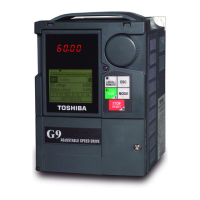238 ACE-tronics G9 ASD Installation and Operation Manual
86 87
Binary Write — Writes the status of the discrete input terminals to the control board during binary input speed
control.
88 89
UP/DOWN Frequency (U
P) — Increases the speed of the motor for the duration of activation until reaching the
Upper-Limit setting or increases the speed of the motor in steps (see F264 for additional information on this feature).
90 91
UP/DOWN Frequency (DOWN) — Decreases the speed of the motor for the duration of activation until reaching
the Lower-Limit (F013) setting or decreases the speed of the motor in steps (see F264 for additional information on
this feature).
92 93
UP/DOWN Frequency (Clear) — While operating in the UP/DOWN Frequency speed control mode this terminal
initiates a 0 Hz output command. If operating with an activated UP/DOWN Frequency (up or down) terminal, the
output goes to the Lower-Limit (F013) setting.
98 99
Forward/Reverse — This setting operates in conjunction with another terminal being set to the Run/Stop function.
When configured to Run (Run/Stop activated), the activation/deactivation of this terminal changes the direction of the
motor.
100 101 Run/Stop — This terminal enables the motor to run when activated and disables the motor when deactivated.
102 103
Commercial Power/ASD Switching —
Initiates the ASD-to-Commercial Power switching function.
See parameter F354 for additional information on this feature.
104 105
Frequency Reference Priority Switching — Toggles frequency control to and from the settings of F004 and
F207.
106 107 V/I Terminal Priority — Assigns Speed control to the V/I Terminal and overrides the F004 setting.
108 109
Command Terminal Board Priority — A
ssigns Command control to the ACE G9-120V-PCB and overrides the
F003 setting.
110 111 Edit Enable — Allows for the override of the lockout parameter setting (F700) allowing for parameter editing.
112 113 Control Switching — Toggles the system to and from the speed control and the torque control modes.
122 123
Fast Deceleration —
Using dynamic braking (if enabled and supported), stops the motor at the fastest rate allowed
by the load.
124 125
Preliminary Excitation
— Applies an excitation current to the motor (holds shaft stationary) for the duration of the
activation.
126 127
Brake Request — Initiates the Brake-Release command. This setting requires that another discrete input terminal
be set to Brake Answerback Input to complete the Brake-Release command and to convey the status of the braking
system to the user or to a dependent subsystem.
Once the braking release function is initiated, the Trouble Internal Timer begins to count down (Trouble Internal
Timer value is set at F630). Should the count-down timer expire before the brake releases or before the Brake
Answerback Input is returned, fault E-11 will occur. Otherwise, the brake releases the motor and normal motor
operations resume.
The Braking Release function is primarily used at startup; but, may be used when the brake is applied while the motor
is running.
130 131
Brake Answerback Input — T
his setting is required when the Braking Request function is used. The function of
this input terminal is to receive the returned the status of the braking system. The returned status is either Released or
Not Released.
If Released is returned within the time setting of F630, normal system function resumes.
If Not Released is returned or if the F630 time setting times out before either signal is returned, then fault E-11 occurs.
The returned signal may also be used to notify the user or control a dependent subsystem.
132 133 3-Step-Variable Speed Hold — Holds the run frequency for the duration of the activation.
134 135 Traverse Permission Signal — This feature is not used with the ACE-tronics G9 ASD.
136 137
Slow-Speed Limit-Switch Forward — Activating this terminal applies the modified Upper-Limit Slow Speed
setting of F294 and the modified Deceleration setting of parameter F283 for the duration of the activation.
Note: NO/NC = Normally Open/Normally Closed. Selection numbers are used when selecting using communications.
Table 7. (Continued) Discrete Input Terminal Assignment Selections and Descriptions.
Sel. No.
Terminal Selection Descriptions
NO NC
quen
feren
ori
itchin
ow-Spe
mit-Swit
Buy: www.ValinOnline.com | Phone 844-385-3099 | Email: CustomerService@valin.com

